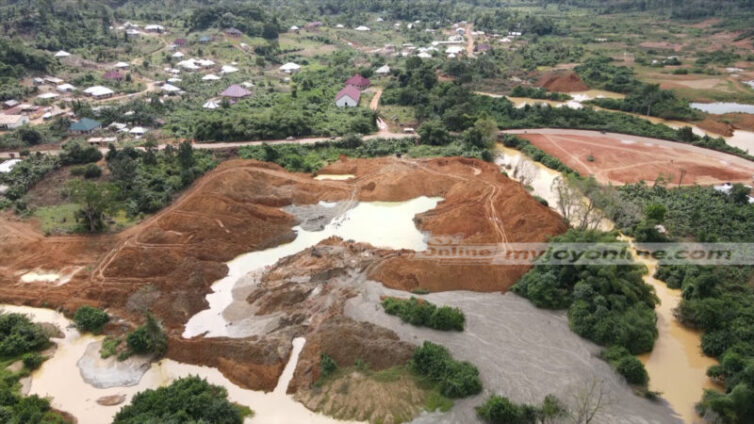
Audio By Carbonatix
The battle for the leadership of Ghana in the 2024 election was initially expected to focus on the economy and corruption.
However, a statement by the Ghana Water Company Limited (GWCL) in late August shifted the nation’s attention to the pressing issue of illegal mining, commonly known as galamsey.
On August 30, the GWCL announced that it was unable to supply water to parts of Cape Coast due to pollution of its water sources caused by galamsey activities. While this was not the first time the GWCL had flagged galamsey as a major threat to its operations, the statement served as a catalyst, prompting Ghanaians, civil society, and religious organizations to intensify their calls to combat the menace.
I have observed with keen interest the protests by the Democracy Hub and the subsequent arrests and prosecutions that followed. Alongside these events, I’ve also noticed the public statements from politicians across the political spectrum, and I must admit, I am deeply disappointed.
Before outlining my reasons for this disappointment, I want to acknowledge the contribution of illegal mining to the economy. According to the Ministry of Lands and Natural Resources, the small-scale mining sector employs over one million Ghanaians—ten times more than the large-scale mining sector. I am also aware of the sector’s contribution to the country’s revenue, particularly in the context of the gold-for-oil initiative.
The complex nature of Ghanaian society, especially in mining communities, makes it difficult to ban small-scale mining or galamsey outright. However, as a nation, we must make a critical choice between "champagne for a few or safe drinking water for all," to borrow a phrase from Thomas Sankara.
Our failure to effectively address the galamsey issue has led to an escalation that now poses an existential threat to the entire country, not just the affected regions of the Western, Eastern, Ashanti, and Bono regions. Our water bodies have been destroyed to such an extent that international organizations warn that Ghana may have to import water if illegal mining activities are not curtailed.
Beyond the devastation of water sources, galamsey also threatens our food supply. Recently, it was reported that foodstuffs exported from Ghana to the U.S. contained dangerous levels of heavy metals—food that we consume daily within our borders.
We are already feeling the effects. In a recent interview with Channel One TV (formerly Citi TV), Prof. Dr. Paul Osei Sampene, a pathologist and researcher at Kwame Nkrumah University of Science and Technology, confirmed that the rise in babies born with defects is directly linked to the consumption of water and food contaminated by galamsey activities. Terminal illnesses such as kidney disease are also increasingly being tied to galamsey.
With these dangers staring us in the face, it is frustrating to hear politicians on both sides engage in a blame game. Galamsey affects everyone, regardless of political affiliation, and while some politicians may be able to afford imported water, the majority of Ghanaians cannot.
The government may worry that a decisive crackdown on galamsey will have political repercussions in the 2024 elections, but I believe President Nana Addo Dankwa Akufo-Addo can tackle this issue head-on and make it a lasting part of his legacy, much like the Free SHS policy.
It’s time to prioritize the fight against galamsey before it’s too late. This is more than a political issue—it’s a matter of survival for our nation.
Latest Stories
-
Eduwatch praises education financing gains but warns delays, teacher gaps could derail reforms
11 minutes -
Kusaal Wikimedians take local language online in 14-day digital campaign
58 minutes -
Stop interfering in each other’s roles – Bole-Bamboi MP appeals to traditional rulers for peace
1 hour -
Livestream: President Mahama addresses nation in New Year message
2 hours -
Industrial and Commercial Workers’ Union call for strong work ethics, economic participation in 2026 new year message
4 hours -
Crossover Joy: Churches in Ghana welcome 2026 with fire and faith
4 hours -
Traffic chaos on Accra–Kumasi Highway leaves hundreds stranded as diversions gridlock
4 hours -
Luv FM Family Party in the Park: Hundreds of families flock to Luv FM family party as more join the queue in excitement
4 hours -
Failure to resolve galamsey menace could send gov’t to opposition – Dr Asah-Asante warns
4 hours -
Leadership Lunch & Learn December edition empowers women leaders with practical insights
4 hours -
12 of the best TV shows to watch this January
5 hours -
All-inclusive Luv FM Family Party underway with colour, music, and laughter as families troop in to Rattray Park
5 hours -
Jospong Group CEO, wife support over 5,000 Ghanaians with food, cash on New Year’s Day
6 hours -
Life begins at 40: A reflection on experience and leadership
7 hours -
Maresca leaves Chelsea after turbulent end to 2025
7 hours

